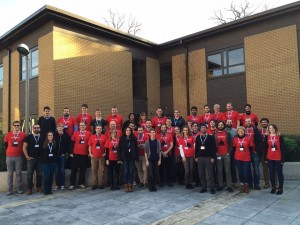The way that science works is fundamentally changing and an equally important transformation is taking place in how companies and societies innovate. The advent of digital technologies is making science and innovation more open, collaborative and global. In this light Commissioner Carlos Moedas has set three goals for EU research and innovation policy: Open Innovation, Open Science and Open to the World. These three goals were first discussed by Commissioner Moedas in a speech in June 2015, showing how research and innovation contribute across the political priorities of the European Commission. These goals do not represent a new policy initiative or funding programme as such, but a way to reinforce existing programmes such as Horizon 2020, and reinvigorate existing policies such as the European Research Area. The book Open Innovation, Open Science, Open to the World – a vision for Europe brings together some of the key conceptual insights behind the “Three Os” and highlights actions that are already taking place or are being prepared at time of publication in May 2016. It is hoped that the ideas and initiatives described in the book will stimulate anyone interested in European research and innovation, and encourage debate and lead to new ideas on what the European Union should do, should not do, or do differently.[1]
You can download the book from the EU Bookshop at http://bookshop.europa.eu/en/open-innovation-open-science-open-to-the-world-pbKI0416263/
Extract from the book on Open Science below
A Vision of the Future
The year is 2030. Open Science has become a reality and is offering a whole range of new, unlimited opportunities for research and discovery worldwide. Scientists, citizens, publishers, research institutions, public and private research funders, students and education professionals as well as companies from around the globe are sharing an open, virtual environment, called The Lab. Open source communities and scientists, publishing companies and the high-tech industry have pushed the EU and UNESCO to develop common open research standards, establishing a virtual learning gateway, offering free public access to all scientific data as well as to all publicly funded research. The OECD as well as many countries from Africa, Asia, and Latin America have adopted these new standards, allowing users to share a common platform to exchange knowledge at a global scale. High-tech start-ups and small public-private partnerships have spread across the globe to become the service providers of the new digital science learning network, empowering researchers, citizens, educators, innovators and students worldwide to share knowledge by using the best available technology. Free and open, high quality and crowd-sourced science, focusing on the grand societal challenges of our time, shapes the daily life of a new generation of researchers.
I would recommend you to read this book for getting a glimpse of future developments. There is also lot of synergies and will add momentum for our vision for Open Geospatial Science [2],[3],[4].
Best wishes,
Suchith
Dr. Suchith Anand
http://www.geoforall.org/
Geo for All – Building and expanding Open Geospatial Science
[1] http://ec.europa.eu/research/openvision/index.cfm
[2] https://opensourcegeospatial.icaci.org/2016/04/open-geospatial-science-2/
[3] http://www.mdpi.com/journal/ijgi/special_issues/science-applications
[4] http://opengeospatialdata.springeropen.com/about/editorial-board


